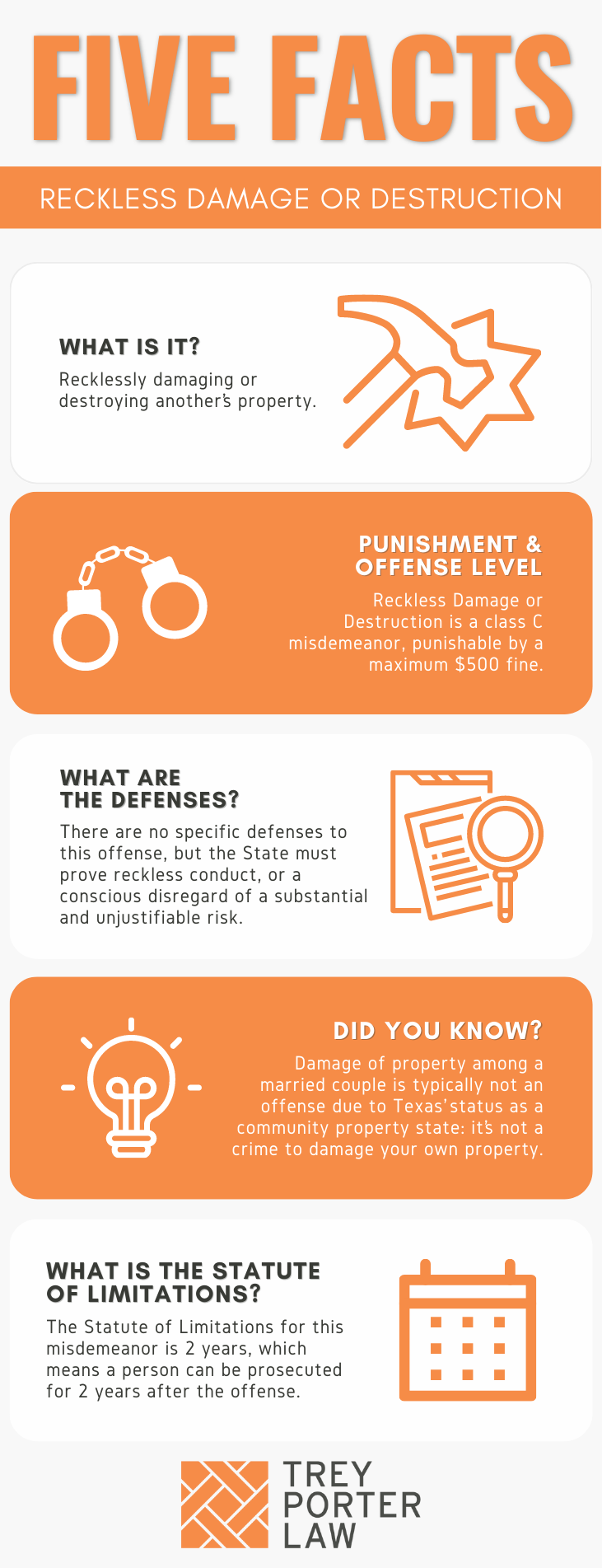WHAT IS RECKLESS DAMAGE OR DESTRUCTION IN TEXAS?
A person recklessly damages or destroys another’s property when the person knew or should have known about an unjustifiable risk, but disregarded that risk, and one’s property was damaged as a result.

WHAT IS THE RECKLESS DAMAGE OR DESTRUCTION LAW IN TEXAS?
Tex. Penal Code § 28.04. RECKLESS DAMAGE OR DESTRUCTION.
(a) A person commits an offense if, without the effective consent of the owner, he recklessly damages or destroys property of the owner.
(b) An offense under this section is a Class C misdemeanor.
WHAT IS THE PENALTY CLASS FOR RECKLESS DAMAGE OR DESTRUCTION IN TEXAS?
Reckless damage or destruction is a Class C misdemeanor, punishable by a fine of $500 and no jail time.
WHAT IS THE PUNISHMENT RANGE FOR RECKLESS DAMAGE OR DESTRUCTION IN TEXAS?
Reckless damage or destruction, a Class C misdemeanor, carries a maximum fine of $500.
WHAT ARE THE PENALTIES FOR RECKLESS DAMAGE OR DESTRUCTION IN TEXAS?
To avoid a conviction, a person charged with reckless damage or destruction may be placed on deferred adjudication for up to 180 days. The judge who defers further proceedings without finding the person guilty may require conditions of deferred adjudication, such as community service, counseling, or payment of any restitution.
WHAT ARE THE DEFENSES TO RECKLESS DAMAGE OR DESTRUCTION IN TEXAS?
The statute does not authorize specific defenses to reckless damage or destruction. A person accused thereof may assert any defense in an attempt to negate at least one of the elements the State must prove at trial.
WHAT IS THE STATUTE OF LIMITATIONS FOR RECKLESS DAMAGE OR DESTRUCTION IN TEXAS?
The statute of limitations for reckless damage or destruction, a Class C misdemeanor, is two years.
RECKLESS DAMAGE OR DESTRUCTION IN TEXAS
Reckless damage or destruction requires that another’s property damage was the result of a person’s recklessness, or conscious disregard of a substantial and unjustifiable risk. It is a lesser-included offense of criminal mischief, and is not punishable by anything beyond a maximum fine of $500.
















